#also i really like greek mythology
Explore tagged Tumblr posts
Text

I haven't posted in a hot minute :D (probably will disappear again after this one) anyway get Zeus and his silly shenanigans!!


He's such a menace and I love that for him


Plus stupid doodle of him transforming into an ant??? I guess??
#like really??? an ANT?#you get seduced by an ANT????#WHAT.#i still don't get it#at least they match his freak...i guess???#zeus#greek mythology#tagamemnon#epic the musical#greek gods#also dw he's fine he just drank a bunch of ambrosia
513 notes
·
View notes
Text


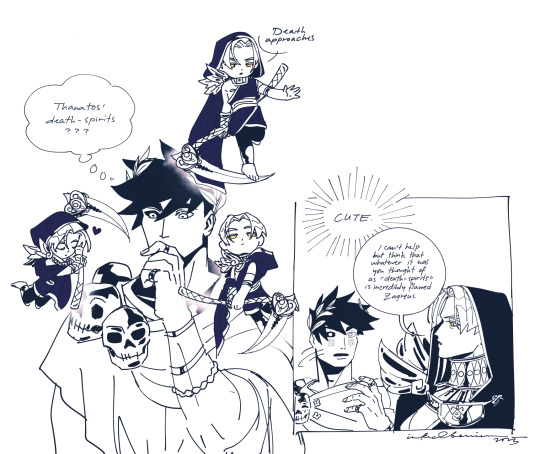

Ker (keres, plural) goddess of violent death
it has come to my attention that when there is Thanatos, the god of gentle death, then there must be another personification of death but of the violent kind and i just found out that they're called the Keres. very shallow research later and i wanted Ker personified in hades game style fashion
took some liberties on how they've become a horde of battlefield body scavenging daughters of Nyx and Erebus, Night and Darkness, and made them all start from a single goddess (Ker) but violent deaths suddenly came at a surplus and so more help was needed hence the death-spirits known as Keres. These death-spirits are likened to the very first iteration of Ker so they're more savage with a single-minded focus and purpose. They did not inherit her capacity of speech nor for scavenging of little trinkets in battlefields.
#from what i've gathered Ker isn't really part of the house of hades???? and mostly closely work with the fates???#and i love the idea of gentle death announcing his coming and going bc most of the time ppl Do know when it's their time to die#but the keres descend upon you like a thief in the night as most violent deaths tend to occur which is without knowing#i also went with the combination of black hair with deep purple eyes since she came from night and darkness#and relishes in the realm of chaos so she's mostly void no starlight#thinking this up gave me all kinds of headcanons in-game lmao#hades#hades game#i don't think it's proper to tag this as greek mythology but keres isn't in the game either#keres#character design#my art#fanart#and a bit of zagthan in there#zagreus#thanatos
307 notes
·
View notes
Text


i think than would be claustrophobic
#reupload bc i messed something up the first time#i really hope this does well bc i like it a lot#this is referencing sisyphus chaining him and trapping him in a closet btw#it makes sense and also hes the type to be affected deeply by shit and keep it to himself forever while pretending hes not affected by it#i also think he cut his hair short so no one could grab it and drag him anywhere haha#my artwork#art#hades game#hades supergiant#hades fanart#thanatos#thanatos hades#artists on tumblr#comic#greek mythology
521 notes
·
View notes
Text

After doing some research on the types of pets people had in ancient Greece, I'd like to imagine that Helen is the sort of person who has a whole menagerie of birds — and she loves each and every one of them very, very much.
It fits well with her being good at mimicry, you know. Talking and imitating and singing with her beloved birds 💜
Close up under the read more:

I had to include that one necklace from the minoan 'saffron goddess' fresco because it's my favourite thing Ever
#helen of sparta#greek mythology#greek myth art#tagamemnon#birds#this started as a helen with birds drawing. then turned into a chance to put helen in mycenaean accurate clothing.#and THEN turned into a sort of hades game art study/sprite because playing with half lineart + half rendering is just too much fun#speaking of fun: I really enjoyed making this!! Once I got a bit experimentative it really came together. I'm happy with the outcome! ^w^#choosing what birds and how many was a challenge... in my mind Helen has dozens of birds and all sorts of species. truly a crazy bird lady.#but I decided to focus on a few for this. maybe another time i'll make a piece with a ridiculous amount of birds for fun >:) hehe#I cant remember the source but I know I read somewhere that people would specifically train magpies to say hello/greet guests#and I love that little factoid (and love magpies very much) so that was an immediate choice for me to feature here.#I also love doves and goldfinches. goldfinches sound so delightful and stand out so they were my 'songbird' choice.#and I'd like to imagine that one specific dove snuggles up on helen's shoulder all the time <3#the only bird that's truly missing here is an indian ringneck parrot (which I initially wanted to put on the shoulder but changed my mind)#so if you're like me and watch too many parrot videos. just know helen has one of them that can't stop talking and posing lmao#capri_art
307 notes
·
View notes
Text
Yeah

#greek mythology#greek myths#hades hermes#hades game#hades 2#hades supergiant#greek myth#greek gods#apollo#phoebus apollo#hermes#hades apollo#also i was gonna draw this but didnt really felt like it so i used hades game sprites
227 notes
·
View notes
Text
I currently have writer's block and fucked around and made Iliad and Odyssey memes :'D Some look like "repeats" but aren't. Just different scenarios/people. Enjoy!
There's... A LOT. I don't care if you pick out your favorites! I put this all in one post as I don't want to spam the tags! :D
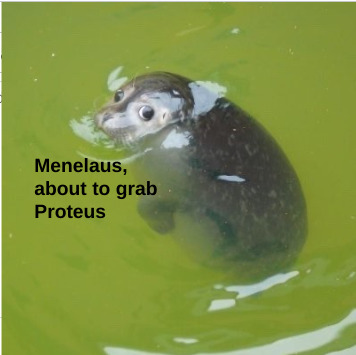
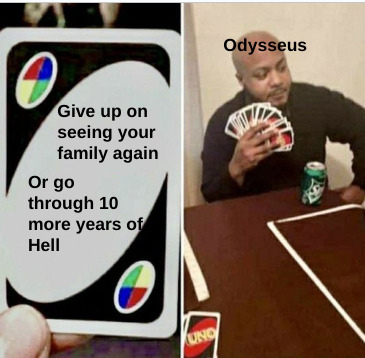

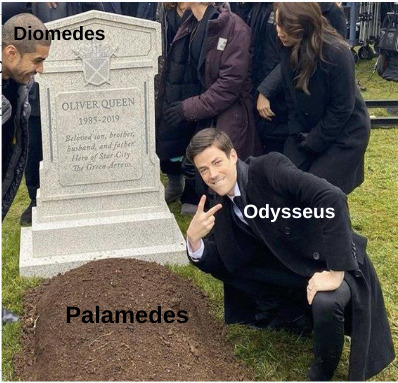
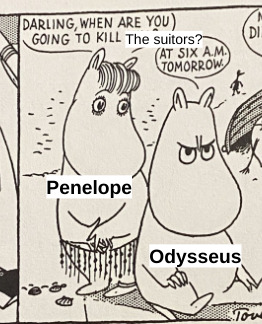

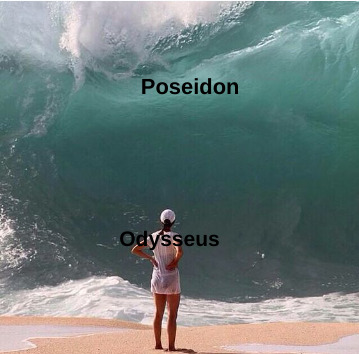



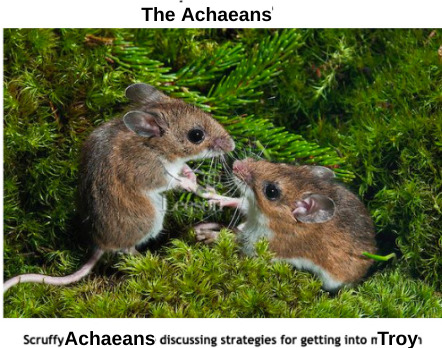
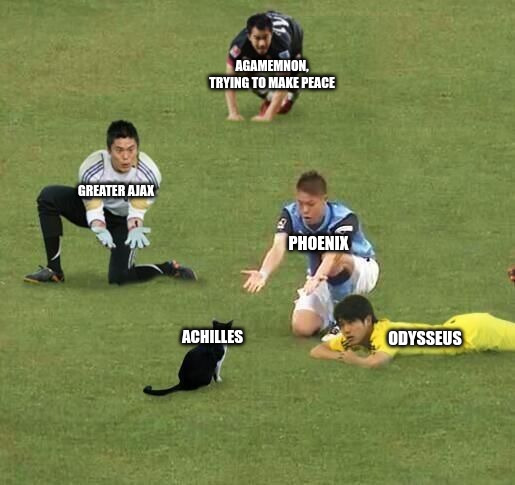

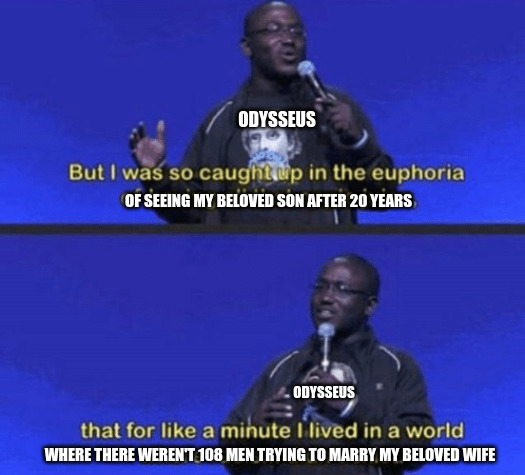
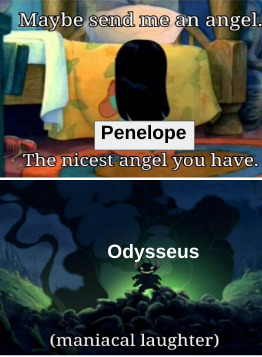

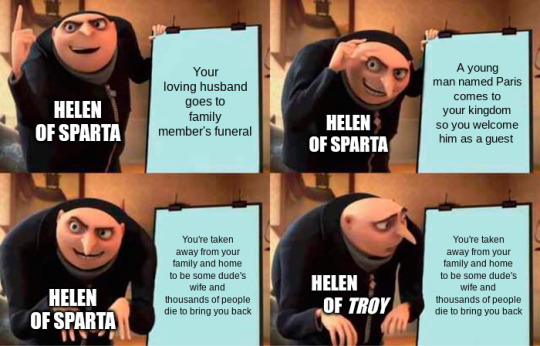

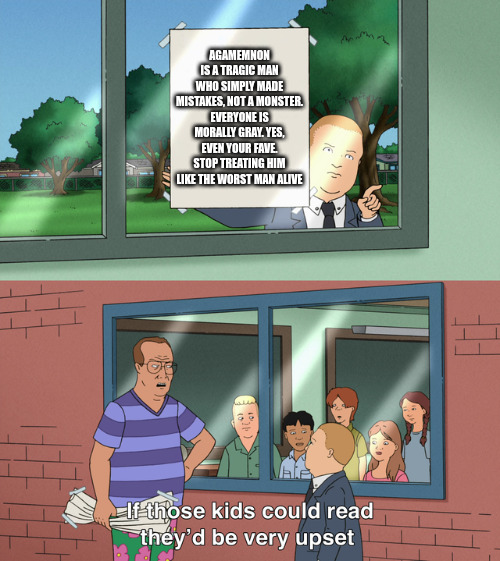
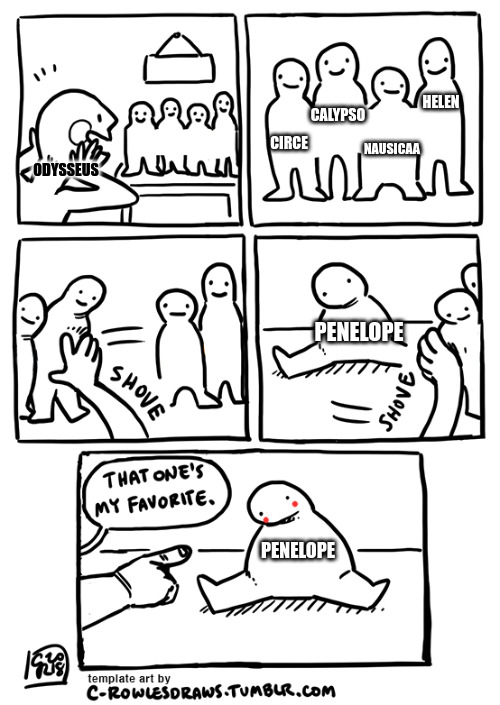
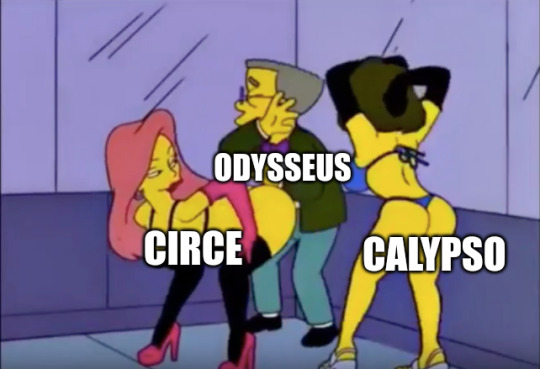
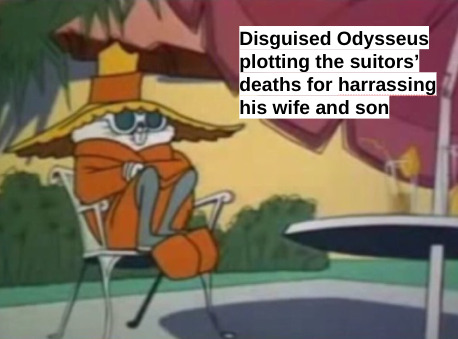
#I hope people get the Proteus one😅It's simple but I really fucking love it.#I'm sorry if ugly but I literally made most of these in google presentation as all I have is a shitty chromebook.#I want to make more Penelope and Helen ones but those are mostly headcanons🥺 so probably something later on#I wanted to have more Agamemnon and Achilles ones too but I don't think I understand their characters enough to do them justice...#I know enough for basics but yea#the circe/calypso is a bit dark but...bleh.#I think “my wife has a migraine” one kind of fits Menelaus more (If he were in a band today? He'd probably be the drummer) but eh!#I'm not an artist and I don't want to use others art without giving credit. (the one art one that's from tumblr DOES have the creator on#the bottom! “c-rowlesdraws” on tumblr! also there's moomin) SO I MAKE DO WITH FUCKING JPEGS LIKE A PEASANT! :D#odysseus#odyssey#the odyssey#odypen#penelope#diomedes#menelaus#helen of sparta#achilles#thetis#agamemnon#circe#calypso#tagamemnon#greek mythology#iliad#the iliad#Mad memes#Mad rambles#shot by odysseus
898 notes
·
View notes
Text
saw some people talking on here about the term salmacian again and like. in the grand scheme of things it’s small. but I don’t think it will ever not be jarring for me to see a group of dyadic people take inspiration from a collection of myths that is famously about the rape of an intersex person, and then to take the name of the rapist. especially given the fact that this is the collection of myths that the word “hermaphrodite” is taken from, and it feels like incredibly poor taste to not understand how much weight that slur carries for us and how much of a difference there is between us reclaiming that in the tradition of intersex radical activism versus dyadic people treating hermaphrodite like it’s something casual to throw around.
#personal#intersex#actuallyintersex#salmacian#h slur#rape tw#like is just genuinely astounds me. like. I really think that I don’t want to hear endosex people talk about the myth of Hermaphroditus#ever. if this is the way you’re going to talk about it#and like I really don’t give a shit about Greek and Roman mythology tbh but this shit#still is so connected to the way that people view intersex people. right now!! today!!#and the view of us as ‘monstrous’#and also connected to like. historical lies about intersex people getting murdered at birth and the justifications for that#interphobia
131 notes
·
View notes
Text
I don’t know if this is a hot take or not, but I dislike it when in modern Greek myth retellings nowadays there’s a side plot of Hera having an affair with one of Zeus’ brothers, Hades or Poseidon.
Webtoon’s Lore Olympus and Netflix’s series Kaos have both done this and I’m already tired of it.
#granted Zeus is a cheating scumbag and deserves sweet karma#but Hera also being a cheater feels off#but she’s the goddess of marriage so her cheating goes against what she stands for#that’s like Ares the god of war pushing for two feuding sides to form a peace treaty#idk how to put it into proper words#I’m just not a fan of this concept#Kaos is still a really good show#edit: cause some people are jumping to stupid conclusions NO I don’t think Zeus cheating is okay#where did I say Zeus cheating was acceptable???#random thoughts#greek mythology#Greek myth#webtoon#lore olympus#Netflix#kaos#Zeus#Hera#hades#poseidon
108 notes
·
View notes
Text
*brushes dust off shoulder and taps into mic* i started reading hera by jennifer saint 😌🦚
#GUYS#THIS IS HOW US HERA APOLOGISTS RISE#GIMME THAT FEMININE RAGE#there's been a couple of times were i thought hera was just the villain of a wromg told story#and imma see the most humanized side of her here#IMMA DEVOURE THIS SHIT#and ofc i ask yall to make me company in this#greek mythology#hera#hera by jennifer saint#ariadne#also i really liked saint's ariadne so why not#yes grecia reads sometimes#books#greek myth
58 notes
·
View notes
Text
i think the reason that kaos is such a successful adaptation, despite being so inaccurate to the myths, it’s that it’s so new, fresh, and entertaining
like, there isn’t one canonical Greek Myth. there are, of course, surviving texts from the era—homer, euripides, aeschlyus, etc. — but those are only what have *survived,* there are countless other myths and ancient retellings that have been lost to time. besides, even between the original myths, there are discrepancies and different interpretations. the myths originated in an oral storytelling tradition, and with each teller, the stories were different. sure, there were some things that stayed consistent throughout the retellings, but almost every myth has elements that varied across sources.
you could always argue that even though that might be true, they could have based the show more on less common myth alternatives that still have sources from the time period, but i personally think the fact that they’re kind of doing their own thing is literally just what the ancient greeks were doing with their myths as well lol
plus, the reason successful greek plays *were* successful was that they told existing stories in a new and interesting light. sure, it was more of a “no one goes to the theatre to find out what happens next, they go to hear how the writer is telling the myth in a new and interesting way” sort of vibe, and kaos *does* have an element of watching bc you don’t know what happens next bc so much has been changed from the original myths, but again, i think this is basically just what the greeks were doing. when something originated in an oral storytelling tradition, there isn’t One Definitive Way to retell it. kaos takes a lot of creative liberties with the source material, but there’s always room for new interpretations and ways of telling these stories
BUT the show is imo so engaging and successful despite all that bc it really gets at the heart of the myths, even though, again, it isn’t at all accurate. zeus is cruel, power-crazed, and incestuous. dionysus is literally just a boy. hera is trying so so hard to be a GirlBoss. hades and persephone are the only ones who seem to have their shit together. poseidon is a douche on a yacht. there’s some incredibly interesting and compelling world building. and at its core, the show is about two things: 1) the gods are human and fallible and 2) you cannot outrun your fate, no matter how hard you try.
and what’s more greek than that?
#there’s also a huge thing about how important love is which is also incredibly greek#anyways i just finished these are my thoughts that have been brewing#my source is i’m a hellenic pagan this shit is literally my religion#i do not care if a greek retelling is accurate as long as it’s fun#if i wanted accuracy i would just reread the iliad or something#which also there WERE a few things i actually did have a problem with retelling wise#i just think that overall it’s a good retelling despite not being accurate#which i think is an unpopular opinion based on the everything i’ve seen#so don’t shoot me#like specifically i really liked how the gods were depicted it felt true to the myths#and i really really really liked how the minotaur was Just A Boy#although i do wish they told that story a lil more accurately but yeah#anyways#kit talks#kaos netflix#kaos#netflix#greek myths#greek mythology
61 notes
·
View notes
Note
I saw it in your tag game post that you're also fond of the Apollo-Heracles conflict 👀 for a myth that appears in only a couple of sources, it sure has a lot of presence in the vase paintings (no seriously, everytime I think I've seen the last of it, I find ten more)
SO do you have any favorites among the paintings that represent this story??
OMG OMG THIS ASK IS A GIFT. IT IS A GIFT THANK YOU VERY MUCH FOR LETTING ME TALK ABOUT THIS
I also think it's extremely interesting that it's a story so popularly portrayed by vase paintings and in such a variety of ways!! It's certainly one of the stories that gets left out of written compilation of Heracles' legend a bit (which is a shame, I think it's a fantastic story) but Apollo had a very peculiar relationship with Heracles in general that I just kind of find amazing (and very, very funny).
Apollo is not a god with any legitimate grudge against Heracles, but he does argue with the mortal a bit like he argues with his favourite brothers 😂Part of why I love the story of Apollo and Heracles fighting over the tripod so much is that it is such a little brother thing for Heracles to be upset with the proclamation his elder brother has given him and so, he throws a great fit, taking up the chair and declaring that he'll just give himself a better prophecy! And Apollo, instead of being a marginally professional big brother, decides to fight him for it until their father has to break up their cat-fight. Like was that not just the plot of the Homeric Hymn to Hermes? Is this not exactly how Apollo treated Hermes when he was a child and now those two are inseparable? 💀
Because of this, my favourite vase paintings tend to be the ones that highlight the personal squabbling between Apollo and Heracles the most. There are some very elaborate ones that have the full host of them - Athena, Heracles, Apollo, Artemis, usually a dog and a doe, I've even seen a couple that had birds and plants etched on them, but the simplest ones that show Heracles about to bonk Apollo with his club out of frustration or depict Heracles nyooming away from Apollo while Apollo (presumably) yells curses about how he's going to fling Heracles head first into Tartarus for daring to take his things? Yeah, those are the premium big brother/little brother things I'm looking for.

(Photo. Marie-Lan Ngyuen)

(Photo. Museo Claudio Faina)
Also the one in the Theoi.com archives is a real classic - perfect energy.

#ginger answers asks#Thank you SO much for letting me talk about this even a little it always makes me smile#Despite their disputes - if you ask me Apollo was quite fond of Heracles#And I think a big part of why I ultimately come to that conclusion is that Apollo never hinders Heracles or withholds blessings from him#He simply calls him a bitch every time he sees him and then makes his life marginally more inconvenient#like any good older brother let's be so fr#It's extremely charming to see him so playful with a mortal he's not in love with/that is not his son#Other moments of Apollo teasing Heracles includes him trying to convince Artemis not to let Heracles catch her doe when he comes#to fulfill that particular labour (again he doesn't actually try to stop it he just puts up a bit of a fuss about it)#and perhaps another of my all time favourites#Personally luring Heracles into Admetus' house so Heracles can wrestle Thanatos while Apollo rescues Alcestis#I DO NOT KNOW WHY MORE PEOPLE DON'T TALK ABOUT THE LUNACY OF APOLLO'S ADMETUS/ALCESTIS PRESERVATION PLAN#He really said “No yeah I know a guy don't worry about Death Incarnate” and then Heracles shows up at Admetus' door like this is a sitcom#The laugh track that plays in my mind every time Admetus opens that door sees Heracles and then looks back at the disguised Apollo like#'HIM?? HERACLES?? Heracles who can break me in seven pieces with a thought Heracles???'#And Apollo just gives him a thumbs up and says “feed him well pookie <33”#Genuinely some of the funniest shit I have the pleasure of reading in greek myth#Another reason I don't think Apollo has any ill will against Heracles though is how Apollo reacts when Heracles#loses Hylas in the Argonautica#Or well some versions of the Argonautica - this is also a story that changes wildly depending on the source/compilation#But Apollo is incredibly sympathetic to Heracles' sorrow and kind of decides there and then that Heracles losing one love#should be the return of another and asks that Zeus let Heracles free Prometheus when he makes his descent into the underworld#Similarly it is Apollo who anoints Alcaeus/Alcides the name Heracles (also dependent on the myth source)#They just had a very fun relationship and it's a serious shame that it's not acknowledged more#apollo#heracles#greek mythology#(Also people do not talk about the fact that Apollo grappled with Heracles to a standstill enough actually)
54 notes
·
View notes
Text

Still not done but I had the idea of adding the gemini constellation to her dress.
#BECAUSE CASTOR AND POLLUX#Someone should really neuter Zeus#He doesn't deserve these kids I swear#helen of troy#Also she has a peacock earring because she misses her HUSBAND#LIKE HERA PLZ SEND HELP#helen#helen of sparta#the iliad#greek mythology#sketch#tagamemnon#art#trojan war#digital art#Zeus#zeus deity#greek gods#greek myths
31 notes
·
View notes
Text
POV: you’re me and you have way too many different designs for Apollo to fit different projects

One for a modern setting mythology project I’m too lazy to actually work on

A stray gods au one that I still haven’t fleshed out I just like drawing my silly boy

One for my main oc who’s down bad for him (pose by mellon_soup) I should draw them more. But you guessed it. I’m lazy.

One for my Homer inspired thing I’ve been working on for a hot minute but we’re still designing the characters (pose also by mellon_soup I use their poses a lot when I’m playing w designs)

And one for a silly ffxiv au (you can actually find me in game w him sometimes! )
#me stuff#my art#apollo#apollo greek mythology#greek mythology#I really like apollo in case it wasn’t obvious#ffxiv oc#stray gods#I’m also an au fiend#I have a massive google doc somewhere of just aus I come up w
48 notes
·
View notes
Text
Thinking about the idea of Helen's desire for kleos, and how she is limited in the ways in which she can achieve it as a woman, it is rather interesting to see how the most 'obvious' solution to it is avoided — through children.
The main consensus surrounding Helen's number of children is that she gives birth to one, a girl called Hermione. Some sources bring up several others, but the earliest and most consistent child mentioned (and birthed by Helen) is her:
He was bringing Alector's daughter from Sparta for his son, mighty Megapenthes, grown up, who'd been borne him by a slave. The gods no longer made a child appear for Helen after she gave birth to her first child, lovely Hermione, who had the form of golden Aphrodite. (Homer, Odyssey, OD.4.10 - ca. 700 BCE)
MENELAUS [Laurentian Scholiast on Sophocles' Electra, 539]: 'And she (Helen) bare to Menelaus, famous with the spear, Hermione and her youngest-born, Nicostratus, a scion of Ares.' (Hesiod, Fragments, CW.F70 - ca. 650 BCE )
Now Menelaus had by Helen a daughter Hermione and, according to some, a son Nicostratus; and by a female slave Pieris, an Aitolian, or, according to Acusilaus, by Tereis, he had a son Megapenthes; and by a nymph Cnossia, according to Eumelus, he had a son Xenodamus (Apollodorus, Library, 3.11.1 - ca. 100 CE)
When Orestes became king of the Lacedemonians, they themselves consented to accept him for they considered that the sons of the daughter of Tyndareus had a claim to the throne prior to that of Nicostratus and Megapenthes, who were sons of Menelaus by a slave woman. On the death of Orestes, there succeeded to the throne Tisamenus, the son of Orestes and of Hermione, the daughter of Menelaus (Pausanias, Description of Greece, 2.18.6 - ca. 174 CE)
It seems the later the sources get, the more children are added (look at that Apollodrus extract! Menelaus has been around!); but even then, Hermione is always mentioned, and often mentioned as the only legitimate child of Helen and Menelaus.*
*Yes the Scholiast on Euripides, Andr. 898 Cypria fragment does mention Pleisthenes the third born child, but... we're ignoring him (lol). As far as I'm aware he's only mentioned once and also no confirmation he's legitimate. Sorry Pleisthenes.
Now, let's talk about that a little. Helen giving birth to a daughter, and proceeding to not have any more children after that raises an important point — Helen does not produce an heir for her husband. Helen, as Menelaus' wife is expected to do that but she simply... doesn't. She has one child and that's it. Sometimes that one child isn't even intentional:
And she (Helen) bare neat-ankled Hermione in the palace, a child unlooked for. (Hesiod, Fragments, CW.F68 - ca. 650 BCE)
unlooked-for = unexpected; unforeseen.
However, as Ruby Blondell mentions in 'Helen of Troy: Beauty, Myth Devastation':
"In normal circumstances such failure to bear a son would jeopardize a Greek wife's position, since it denies her a woman's primary avenue to status within her husband's household. Since she did not relocate upon marriage, however, Helen needs no sons to establish her status at Sparta. Moreover, the absence of a son helps her maintain her independence. When a son grows up, he becomes another source of male authority over his mother." (pg. 32-33)
She has different circumstances from her peers; she doesn't need children to retain her status. In fact, if she were to bear a son it might be worse for her position.
This would explain her reluctance for children, if the lack of them was indeed a choice. Nonetheless, it's worth exploring the possibility that it is unintentional. There's certainly evidence for it being so, if we look at how Hermione fares in adulthood with her own fertility:
(to Andromache) but as for thee, slave and captive, thou wouldst fain oust me and secure this palace for thyself, and thanks to thy enchantment I am hated by my husband; thou it is that hast made my womb barren and cheated my hopes (Euripides, Andromache, 117 - ca. 425 BCE)
Helen is struggling to have children, and now Hermione is struggling to have children — like mother, like daughter. Is the infertility hereditary? Or perhaps there are some godly influences afoot:
TYNDAREUS Scholiast on Euripides' Orestes 249: Stesichorus says that while sacrificing to the gods Tyndareus forgot Aphrodite and that the goddess was angry and made his daughters twice and thrice wed and deserters of their husbands (Hesiod, Fragments, CW.F67 - ca. 650 BCE )
While this extract focuses only on Tyndareus' daughters and their infidelity, it wouldn't be a stretch to say that the curse of a god could extend to multiple generations of a family (e.g. the house of Atreus) and in other ways — in this case, not being able to get pregnant/have a successful pregnancy.
However, considering the infertility as an intervention by the gods, I don't think that this is necessarily a 'curse'. This feels more like fate. That, regardless of whether it is Helen's choice to have just Hermione or not, it is destined to happen. The subtext being 'just Hermione' and no more.
Blondell mentions that in Theocritus' poem The Epithamaly of Helen, the chorus pray that Helen bears Menelaus a child that resembles herself. If we take the quote from The Odyssey earlier, of Hermione 'who had the form of golden Aphrodite', we can assume that prayer is fulfilled. Blondell also says:
"There is something a little strange, however, about the chorus's prayer. ... since there is no doubt about a woman's identity as a mother, the crucial point, for a husband, is that his wife's offspring should resemble him. It seems strange too, at a wedding, to pray in effect for a daughter as opposed to a son and heir." (pg. 32)
Helen will have a child, and it will resemble her, but that's it. No sons, no heirs.
Enter stage left: Zeus' plan to reduce the population of demigods by having a beautiful daughter, who will instigate a long and bloody war.
How do you get such a daughter to instigate a war? By leaving her husband because she desires more than the cards she has been dealt.
If Helen does desire kleos, but is essentially barred from achieving it in the ways a woman traditionally does, then she must seek it elsewhere.
In choosing to leave with (effeminate, unconventional) Paris: If she doesn't wish to have children, maybe she thinks she can escape the 'inevitable' fate of all wives to bear a son and be known only as their mother — she will seek kleos elsewhere. If she does wish to have children, maybe she has tried to bear children, many, many times after Hermione and cannot, and in that shame of failing to meet the minimum standards of being a woman — she will seek kleos elsewhere.
Whatever her feelings are on the matter, fate remains the same: Helen will have a daughter that resembles her, and Helen will go to Troy with Paris. The facts still remain the same too: Helen cannot bear a son, and this separates her from womanhood. She cannot successfully be a woman by society's standards, and cannot make her legacy her children.
She must find kleos in other ways.
#helen of sparta#greek mythology#hermione of sparta#menelaus#analysis#im certain there are other sources that bring up children but I thought this would suffice to illustrate my point. Hermione is always there#Also: are there sources that mention children via Paris? yes there are - but that's *after* leaving to Troy.#So it doesn't really matter after that point speaking in terms of fate. She's already left her husband! War will break out.#Anyways I found this train of thought really interesting and wanted to write a post about it <3 Helen is so complex and sad </3#she's the most beautiful woman in the world. but is she the most moral or ideal woman in the world by her society? not really.#she's so unconventional and that comes out in many different ways (like this)
62 notes
·
View notes
Text

young ody and penny
#i....uh.....don't really like this?#but i spent way too much time on it#so here we are#tagamemnon#greek myth#greek mythology#odysseus#penelope#odysseus of ithaca#penelope of sparta#penelope of ithaca#odypen#odysseus x penelope#also penelope having hair that short is probably super inaccurate#but i don't care#i love short hair. i think it's cute#† tyto draws
24 notes
·
View notes
Text
I think people sleep on this moment in the Odyssey...
If I'm wrong, not getting full context, or see something that isn't there, feel free to give evidence to explain why.
Here he crept under a pair of bushes, one an olive, the other a wild olive, which grew from the same stem with their branches so closely intertwined that when the winds blew moist not a breath could get inside, nor could the rain soak right through to the earth.
(Book 5, Rieu)
I think this is about Penelope and him.
Obviously, their marriage bed is made from an Olive tree. If it's just about Athena then why are there two mentioned? Why did Homer mention two when he could've just said he took refuge under one? Or a completely different type of tree? Why mention them being intertwined?
One an olive: Penelope, who has been with society and "safe" in Ithaca ("Safe" because of the suitors)
One wild: Odysseus, who has dealt with literal monsters and immortals and has just escaped from Calypso. Literally naked and filthy, a "wild man".
"which grew from the same stem with their branches": Them both being together at first, before being separated.
"so closely intertwined that when the winds blew moist not a breath could get inside, nor could the rain soak right through to the earth.": Despite being separated, they are still "intertwined". Whether you want to think of it as them being likeminded or simply connected, even though they are apart, nothing could get in between them. 🥺
I don't know what else Homer could be referring to other than them.
#It's funny to me as even though she's not always mentioned when he retells his tale to the Phaeacians. The narrator mentions her CONSTANTLY#Because even if Odysseus doesn't say it. He's thinking about her often#honestly I...I don't think it COULD be anything else but I'm sure people will be mad that the simp loves his wife. 🤷#This part is the reason why I mention them calling the bed their “nest” as that's what THIS part calls it too. and I find it really cute#It was a nest where he SHOULD have stayed in with his family but no... :'D#half-empty nest😞#also it could be him comforting himself??? He's been forced to be in beds he doesn't want to be in for YEARS#Now. he's free and while it's not “fancy”. but at least it's SOMEWHAT like his own#greek mythology#tagamemnon#odyssey#the odyssey#penelope#odysseus#odypen#odysseus and penelope#odysseus x penelope#Mad rambles#shot by odysseus#essay
352 notes
·
View notes